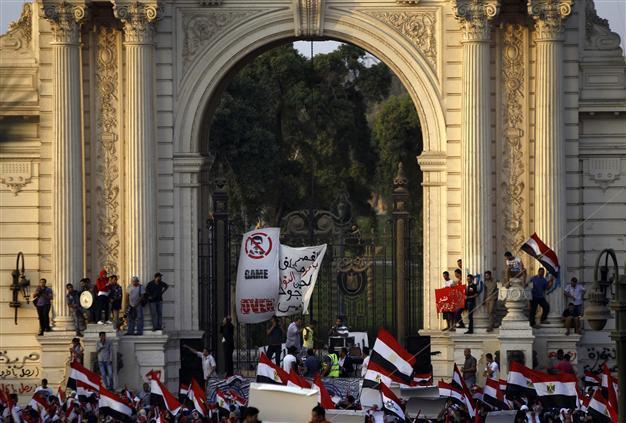Ankara calls on Cairo to stick to democratic norms
ANKARA / CAIRO

Protesters opposing Egyptian President Mohamed Morsi and the Muslim Brotherhood take part in a demonstration in front of the Presidential Palace 'Qasr Al Quba' in Cairo, July 2. REUTERS photo
Ankara has called on Egyptian authorities to respect the rule of law and the people’s will by sticking to democratic norms, in an apparent reference to the army’s possible intervention into the country’s crisis-torn political scene.
For his part, Turkish Foreign Minister Ahmet Davutoğlu discussed the situation in Egypt with a number of his counterparts before returning from his bilateral visit to Singapore. Davutoğlu held talks on the phone with U.S. Secretary of State John Kerry as well as the British, French, German and Qatari foreign ministers, sources told the Daily News.
“Turkey considers the stability and security of brother and friend Egypt as crucially important for both our country and the region, and Turkey has always supported the free will of the noble Egyptian people in the Jan. 25 revolution,” a Foreign Ministry statement said today.
In a show of clear support, EU Minister Egemen Bağış hailed the firm stance of Morsi against coup plotters as the democratically elected leader of Egypt. Underlining that the worst democracy is even much better the best version of military coups, Bağış said: “Mr. Morsi tried to make very important reforms in a very short period of time, in a country with so many problems and where reforms are hard to realize."
He added that Morsi deserved the support of the entire world especially of the European Union. “We should stand against military coups everywhere in the world. We should stand together against any form of coup,” he stressed.
Army chief meets opposition leaderEgypt’s armed forces chief was meeting today with opposition leader Mohamed ElBaradei and top Sunni Muslim and Coptic Christian leaders ahead of the army’s deadline due to expire at around 5 p.m. The discussions with Gen. Abdel Fattah al-Sisi focused on the road map the military threatened to impose late yesterday unless President Mohamed Morsi “meets the demands of the people,” following four days of mass protests calling for his resignation.
The talks involved al-Sisi, former U.N. nuclear watchdog chief ElBaradei, Coptic Patriarch Tawadros II and Sheikh Ahmed al-Tayeb, the grand imam of Al-Azhar, the top Sunni Muslim authority. Also present were representatives of the Salafi Al-Nour Party. The Brotherhood’s political arm, the Freedom and Justice Party, refused an invitation to meet al-Sisi, saying it only recognized the elected president.
“We are deeply concerned about the ‘deadly incidents’ that occurred between groups which have different opinions … The course of events should not overshadow the big and historic gains of Egypt’s Revolution. All parties should make efforts to support Egypt’s unity, democratic institutions, stability, economic development and avoid all types of violence and provocation,” the statement read. “It is always possible to find solutions to political and economic problems with dialogue where democratic mechanisms are operated.”
But Egypt’s army commander and President Mohamed Morsi each pledged his life to defy the other in early July 2 statements. The military chiefs issued a call to battle in a statement headlined “The Final Hours.” They said they were willing to shed blood against “terrorists and fools” after Morsi refused to give up his elected office.
“The price of preserving legitimacy is my life,” Morsi countered.
“In every democracy, it is a universal fact that leaders elected in polls leave their posts by election. Egyptian people and current administrators have the might to create a road map to overcome the current crisis under the framework of democratic rules. Staying under the limits of constitutional legitimacy, respecting the Egyptian people’s will will strengthen the democratic system,” the ministry statement said.
State TV taken over by militaryTwo army armored vehicles took up positions outside the state broadcasting headquarters on the Nile River bank, while most staff were evacuated from the building, security sources said. The state news agency MENA said civil servants were occupying the Cabinet office and would not let Prime Minister Hisham Qandil enter the building.
The official spokesman of Morsi’s Muslim Brotherhood movement said supporters were willing to become martyrs to defend him. “There is only one thing we can do: we will stand in between the tanks and the president,” Gehad El-Haddad told Reuters at the movement’s protest encampment in a Cairo suburb that houses many military installations and is near the presidential palace. “We will not allow the will of the Egyptian people to be bullied again by the military machine.”
The state-run Al-Ahram newspaper said Morsi was expected to either step down or be removed from office and that the army would set up a three-member presidential council to be chaired by the head of the Supreme Constitutional Court.
